LAND BASED SHARK FISHING
Wholesome Pastime or Reckless Nuisance?
by Ryan Wood of RWood Outdoors
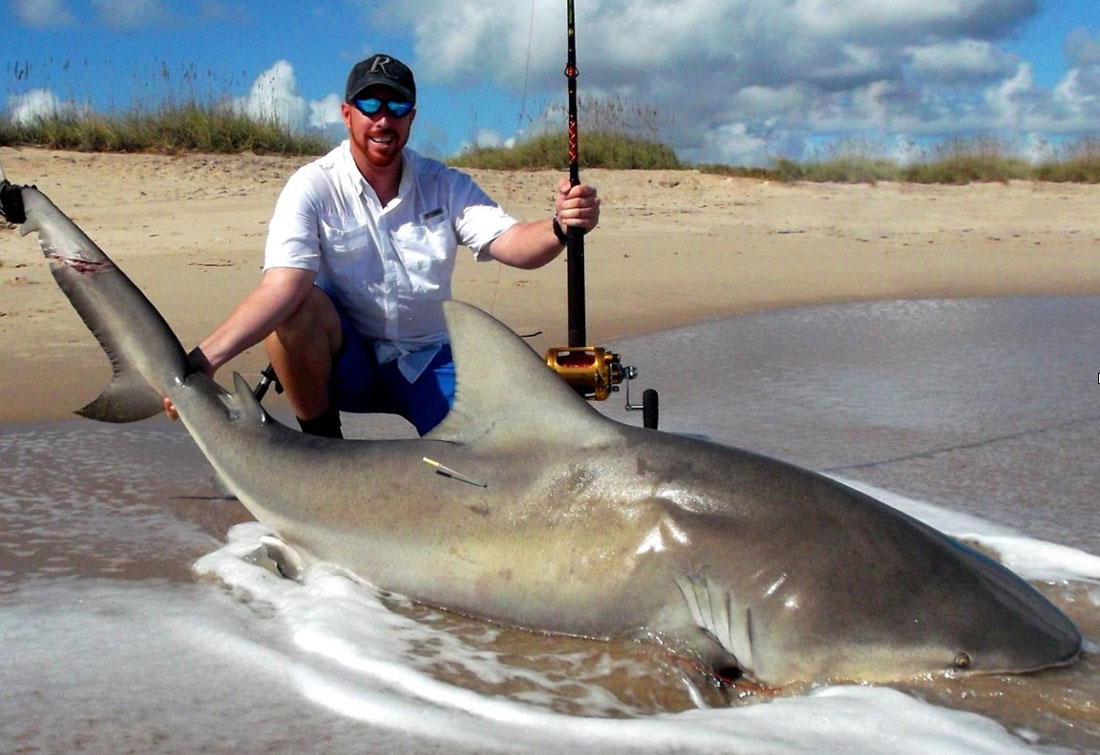
Author Ryan Wood snapped a photo with one of the many sharks he has tagged and released for the NMFS Shark Tagging Program.
A FOREWORD ON THE CONTROVERSY OF LAND BASED SHARK FISHING
These days, it seems that someone cannot turn on their television, listen to the radio, or open a newspaper without being met by some type of major controversy. And for whatever reason, the two sides of any contested topic seem to be more polarized than ever with only extreme and exaggerated viewpoints making the news. Now I am not one to talk religion or politics at the dinner table, but if there is a way to get me fired up, it is when my most deeply held values come under attack.
Lately, the sport of land based shark fishing (LBSF) has made the headlines, and not in a good way. Whether it is a dead shark that washes up on the beach, or a turf war between swimmers and fishermen, bad publicity is not hard to find. To make matters worse, Florida happens to be a worldwide epicenter for shark attacks, and some folks are quick to jump to the conclusion that nearby anglers somehow contributed to those incidents.
As a born and raised native Floridian, sportfishing has been in my blood ever since I can remember. Everything from bluegill to blue marlin has captured my imagination, and I can think of no better place to grow up. Some of my earliest and fondest memories of childhood were of my parents taking me to SeaWorld in Orlando. Of all the exhibits, I was most enamored by the “Shark Encounter,” and the passion for these magnificent animals has not ceased to this day.
I will never forget the first time I had an opportunity to catch a shark on rod and reel. My excitement was hard to contain. The best part was releasing it back into the water and watching it swim free. Looking at a shark in an aquarium was one thing, but to have a personal interaction with one was a profound experience. Fast forward to today, and at the time of this publication, I have released nearly 300 sharks, the vast majority of which were caught from land. It became a challenge to refine my gear and my tactics. I was constantly learning, and my appreciation for our resources and wildlife continued to grow.
I forgot to mention, I am an avid surfer as well. I have spent countless hours with my feet dangling below my board as I wait for my next wave. While I sincerely hope my two hobbies never cross paths, I know better than most that I am sharing the water with sharks at any given time. I am a guest in their territory and not the other way around. Whatever reason I find myself at the beach, I recognize that everyone else has their own reason for being there, and that reason may not be the same as mine.
The controversy over land based shark fishing is centered around two primary themes:
- shark fishing is detrimental to shark populations, and
- shark fishing poses a hazard to people in the water nearby.
I suppose it is only appropriate that one of nature’s most misunderstood animals is shrouded by misguided myths regarding human interactions with them; it is my hope to help spread awareness and education on the subject by discussing each of these two themes in further detail.
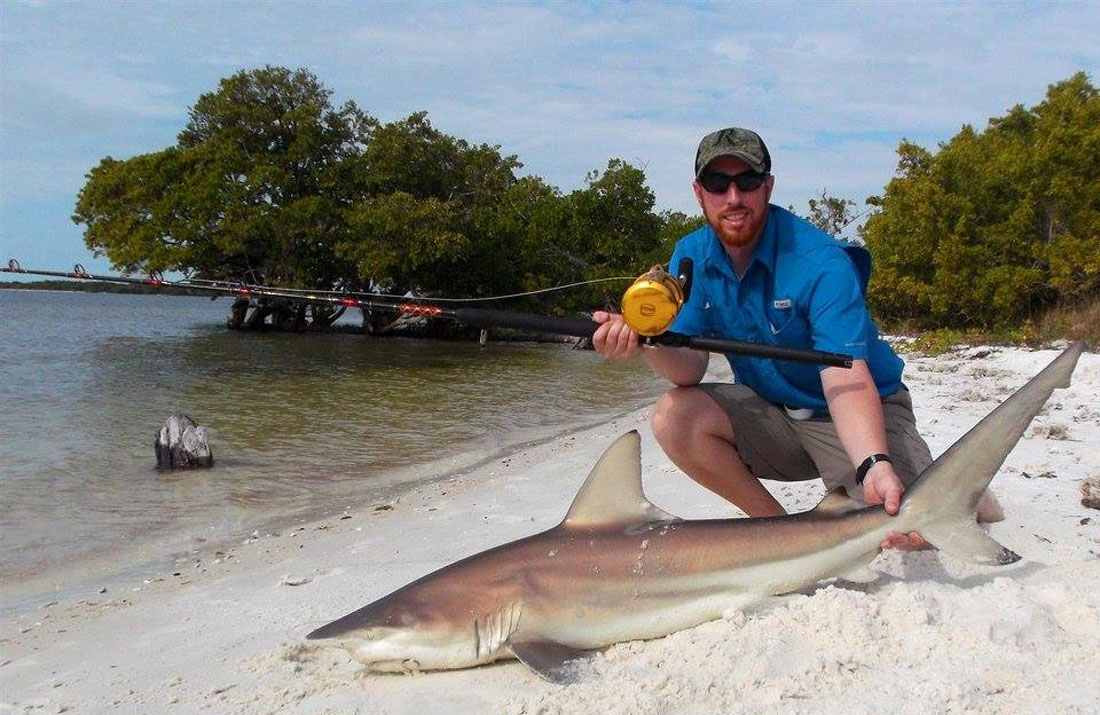
The current controversy is not isolated to just shark fishing from the beach, but extends to any shore-based location, including the Spoil Islands
Is Shark Fishing Detrimental to Shark Populations?
How does land based shark fishing affect the sharks? While I won’t claim to have formally studied this to have my findings published in a reputable scientific journal, spending a lot of time on the water over the years provides plenty of opportunity for observation.
For starters, modern shark anglers do not hate sharks. The concept of the “sportsman” may be hard for some to grasp, after all I suppose it is a bit counter-intuitive. But to clarify: deer hunters do not hate deer. Duck hunters do not have a personal vendetta against waterfowl. Even when the sport results in the legal harvest of that animal, the individuals partaking are doing so out of their passion for the outdoors and a deep personal connection with that species.
Us humans have had a rocky past, where many species were hunted to the brink of extinction (or in some unfortunate cases, actual extinction). But when those species are able to make a rebound, most often sportsman are the ones to thank. Funds from the sales of hunting and fishing licenses finance scientific research and management endeavors. Add in the economic value of the fishing and hunting industries, and behold a powerful force for conservation. After all, the people that enjoy those sports want to continue to enjoy those sports year after year.
Harvest of certain shark species within specified size and bag limits is permitted, and some folks choose to keep their catch. I cannot fault anyone for that. Those regulations are put in place to ensure populations remain sustainable, and as new research comes in, those regulations are adjusted accordingly. However, I personally do not advise that people harvest sharks for their food value. While the meat doesn’t taste bad, elevated levels of mercury and other toxins are often present. A shark is an apex predator that grows slowly and can live for a long time. When any animal consumes a toxin such as mercury it remains in their body for its entire life. If that animal is then eaten by a predator, the predator now absorbs the toxins of their prey. That cycle continues on up to the top of the food chain to species like sharks, or by our own choosing, humans. The safest fish for human consumption are generally small or fast-growing species.
The ironic part about the critical viewpoint against recreational shark fishing, is that for the vast majority of anglers, the goal is catch and release. Long gone are the days where people believed “the only good shark is a dead shark.” I remember the first time I caught a shark that someone else had tagged. In the wee hours in the middle of an ordinary night, I reeled in a lemon shark with a tag sticking out of its back, just below the dorsal fin. Not having any prior knowledge of shark tagging, I took some measurements, snapped a couple pictures of the shark and the tag number, and quickly returned it to the sea.
Upon my return home, I Googled “shark tagging”, and the first website on my search results happened to be the National Marine Fisheries Service (NMFS) Shark Tagging Program. I filled out a simple form documenting the details of the catch, and emailed it in. A few weeks later, I received a package with in the mail which included a hat, some stickers, and all sorts of information about my shark. It turns out, I was the fourth person to recapture that particular shark, and my information added to the story of where the shark travelled and how big it grew. How cool!
Since then, I have started tagging sharks of my own, and there are now dozens of sharks swimming around out there with my tags. The efforts of recreational anglers who report tagged sharks or tag new sharks, contribute meaningful data to the scientific research and conservation for sharks. The tagging program itself is a testament to a successful catch and release fishery. Captured sharks that are released will continue to breed, carry out their role in the ecosystem, and offer sporting opportunities to anglers. For more information on shark tagging, view my instructional video and also check out the NMFS/NOAA website.
Author Ryan Wood demonstrates how to properly measure, tag, and release a shark.
An unfortunate consequence of recreational angling, is that occasionally sharks will not survive release. In general, sharks are hardy animals, and will swim off just fine, but sometimes this is not the case. Hammerhead sharks appear to be particularly susceptible. However, in my observation, the frequency of angler caused mortality is no greater than any other sportfish. The difference is, the death of a largemouth bass is not something that makes the news. A large shark that washes up dead on a beach will.
Fortunately, the shark fishing community seems to be naturally improving its practices to minimize this occurrence. The use of circle hooks is more prevalent than ever resulting in the hook planting itself safely in the corner of the mouth rather than in the gills or stomach where it can cause major damage. I have found that hookup percentages are actually better with circle hooks over J-hooks, so that is a win-win.
“Shark angling teams are assembling the fishing equivalent of a NASCAR pit crew which are intended to land, unhook, photograph, measure, and release the shark as quickly as possible.”
It used to be a bragging point to tell stories of doing battle with a shark and emerging victorious hours later. Now, the pendulum seems to have swung the other way, where people are using heavier tackle to avoid prolonged fights. Shark angling teams are assembling the fishing equivalent of a NASCAR pit crew which are intended to land, unhook, photograph, measure, and release the shark as quickly as possible.
Folks are recognizing the importance of keeping large sharks at least partially submerged in water when landed from shore to support the animal. Sharks do not have a rib cage (or any bony skeleton for that matter), and their own weight unsupported for an extended period of time can crush their internal organs. Beaching a shark is fine as long as it is done quickly. Having caught sharks from both the shore and by boat, I can say it is far safer for the angler (and thus the shark) to unhook a shark on land then it is in the water. In either case, if the hook cannot be safely removed, best practice is to cut the line as close to the hook as possible, and the salt water will rust out the hook before too long.
These measures are good for the sport and good for the sharks. However, negative media attention continues to be directed to a niche group of recreational anglers, and a rare occurrence of incidents. Meanwhile catastrophic commercial practices such as shark finning remain in place around the world decimating shark populations by the millions. Critics need to realize the big-picture benefits of recreational angling and direct their attention to the real problems.
Author Ryan Wood documents an outing of shark fishing at Sebastian Inlet.
Does Shark Fishing Pose A Hazard to People in the Water Nearby?
Ever since the movie Jaws premiered in 1975, anyone who enters the water has sharks in the back of their mind. Our culture has adopted the term shark “attack” as commonplace language, but it is not really fitting of reality. “Attack” implies “intent to do harm,” and a wild animal exhibiting its normal behavior to survive is hardly that. Regardless of the proper terminology, people do get bitten by sharks, and a small percentage of those rare encounters are fatal.
Anyone who has witnessed a shark on the hunt will acknowledge it is an impressive sight. Television often does not do it justice. The speed, stealth, and power of these animals is a wonder of the natural world. Every time humans enter the water to swim, surf, snorkel, dive, etc., we take a risk. Granted, the risk is small, but it is there. Most people are blissfully unaware about their proximity to sharks anytime they enter the water.
“While one group of people goes to the beach hoping to never cross paths with a shark, and another group (shark fishermen) come with the goal to tangle with one, controversy is all but inevitable.”
While one group of people goes to the beach hoping to never cross paths with a shark, and another group (shark fishermen) come with the goal to tangle with one, controversy is all but inevitable. These two parties are often sharing the same beach at the same time. Since shark bites on humans are so rare, it would be practically impossible to scientifically determine the effect of shark fishing on the probability of events we know as shark attacks. But, the possibility alone has been enough for some people to call for the increased regulation or outright ban on land based shark fishing. After all, Florida counts on tourism to its beaches, and recreating scenes from Jaws would not be good for business.
The reality is sharks are not bloodthirsty killers. In my observation, sharks rarely exhibit aggressive behavior, and more commonly feed by scavenging. They clean up the ocean from sick, injured, or dead sea life, and get a meal while doing it. It is this behavior that shark anglers use as their strategy for catching one. Put a hook in a fish, drop it in the water, and wait for a shark to cruise by and eat it. This practice does not incite a feeding frenzy as some are led to believe.
We are taught that a shark can sense a drop of blood from miles away, and while their sense of smell is indeed remarkable, this is a bit of a myth. In my experience, sharks can be picky eaters, and the mere presence of blood or bait does not cause every shark in the ocean to drop what it is doing and rush toward the spot. This is mainly because the ocean is a big place, and such a small concentration of a shark attracting substance in all that water only goes so far. My observation is that sharks are always present, and they are present because of an abundance of natural food, not the single fish an angler drops for bait. To further my argument, sharks commonly will eat artificial lures and flies. This means sharks feed by sight, sound, and vibrations when smell is removed from the equation.
I think the real root cause of the issue has nothing to do with sharks. It has to do with people. People come to the water’s edge for different reasons and if one party interferes with the experience of someone else (real or perceived), the tempers begin to flare.
Personally, I don’t like fishing near other people primarily for the selfish reason that I think people in the water scare the fish away. I am surprised more people aren’t like that, but I suppose there is some superstition about “secret spots” and such and that may never change. In my observation, the point of contention stems from a perceived sense of “ownership” of a public beach. That is why people get defensive if they are asked to move. I am not advocating cursing others out and lecturing about “rights,” but one form of recreation cannot be considered superior over another.
“People acting responsibly with a code of etiquette is the answer, not unnecessary regulation.”
I think a simple policy for “first come first serve” eliminates most of the problems. If I am fishing, I won’t set my lines on top of swimmers and surfers. If I am surfing, I won’t paddle out over fisherman’s lines. For whatever reason, some people don’t get that. I don’t think it is unreasonable for fisherman and surfers alike to move a couple hundred yards or even a couple miles down the beach if someone else got there first. To be fair, if I am fishing on a secluded stretch of beach early in the morning and it gets crowded as the day goes on, I pack up my things and go home. But if I am all by myself with no one around for 500 yards in either direction, and a surfer paddles out on right top of my shark lines, because I happened to unknowingly plant myself in their “secret surf break,” who is the bad guy? Each party thinks they are more entitled while the other is a nuisance. This happens to me all the time. People acting responsibly with a code of etiquette is the answer, not unnecessary regulation.
If the practice of shark fishing was to be regulated, what would it look like? Could singling out a particular type of fishing even be possible? After all, no one has control over what bites their line. I have caught plenty of trophy fish like tarpon, jack crevalle, and bull redfish on my bait and rigs intended for shark. I have caught sharks by accident while fishing for other species like snook or pompano. I have witnessed more aggressive behavior out of sharks while reeling in a small fish than I do when actually shark fishing. I have caught sharks while casting artificial lures. I would have to believe that an attempt to regulate shark fishing would have to be accomplished by regulating any type of fishing to be effective and enforceable.
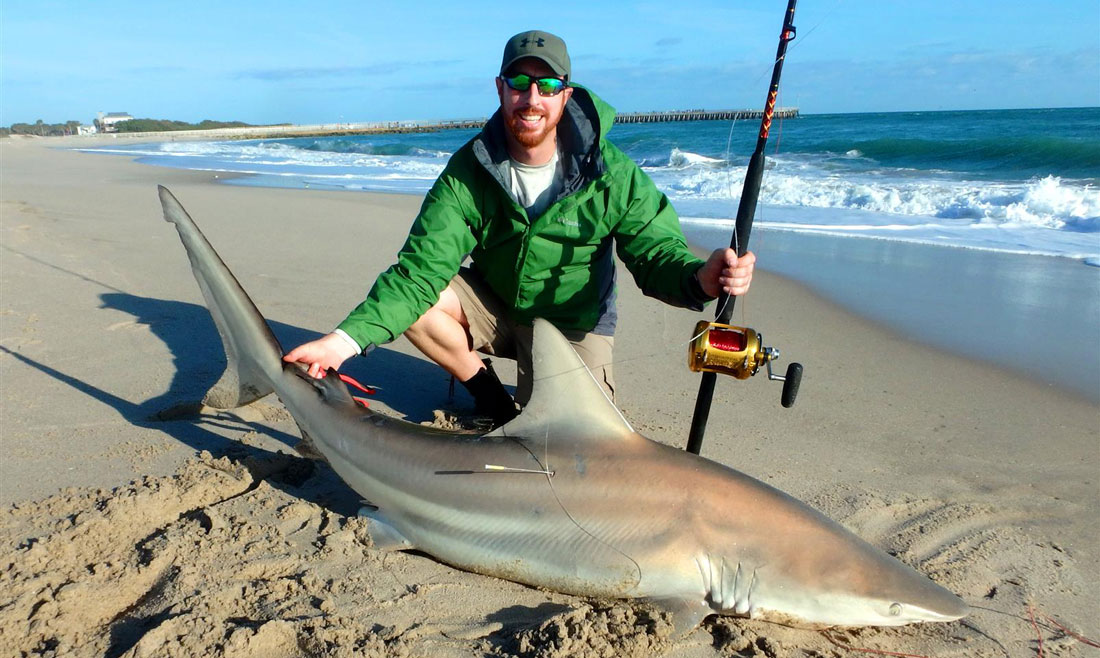
Ryan Wood poses for a quick photo on the beach with a shark caught, tagged, and released.
Conclusion
Sharks are a fantastic sportfish. The reasons anglers pursue sailfish or tarpon are the same reasons we fish for sharks. I do not see the controversy subsiding anytime soon. Sadly, responsible shark fisherman face an uphill battle simply because they are outnumbered by general beachgoers who do not feel the same way, regardless of the facts. I am worried about the legacy we are leaving behind to future generations of outdoorsmen and women. I have seen young anglers criticized by other beachgoers for shark fishing. I am a firm believer that our youth needs more tackle boxes and less Xboxes in our society. This is a complex issue, and complex issues rarely have simple solutions. If I were to offer some steps in the right direction, it would be to respect one another, respect our natural resources, and educate the masses about this wonderful sport.
Want to weigh in? Post your thoughts in the comments section below. Be sure to check out Ryan’s channel, RWood Outdoors on YouTube.




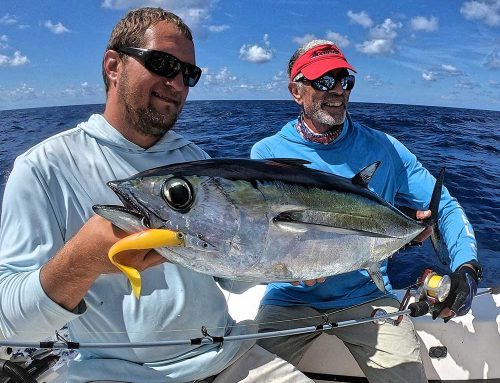
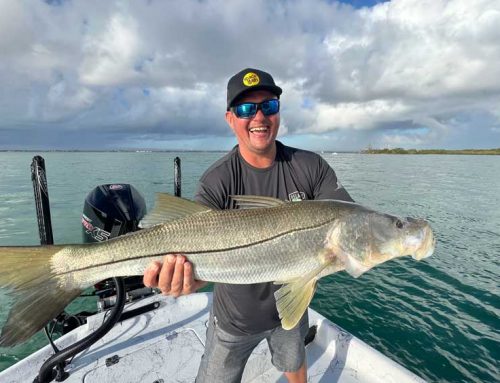


Well said Ryan!
With all due respect, in your article you failed to discuss one of the main citizen concerns AND concerns of the FWC, which is the illegal handling of prohibited species of sharks. There already is a law in place FAC 68B 2.002 that states it’s illegal to temporarily posses prohibited species for the purpose of measuring and photographing. Historically, this has not been enforced by FWC because their Shark Smart guidelines were written to suggest handling practices that contradicted and conflicted with this existing law. FWC admitted this is a problem at their Commissioner’s Meeting on April 25th. You can bet that FWC will be fixing this issue in the form of new regulation and standard. As I stated, Commissioner Mike Sole specifically addressed this at the April 25th meeting and asked for change.
You also stated that “in rare instances” Sharks may not survive, and that it’s no different than any other fishery, but since it’s a large shark, it gets all the media attention. First, I challenge you to disclose how you can say the instances of dead sharks are rare? FWC does have a reporting system on their website, the GROSSLY UNDER REPORTED Fishkill database. If you look back over the past several years you will see the numbers ARE NOT RARE. In 2016 alone, 62 dead sharks were reported with 20, yes 20 of them being the prohibited, endangered hammerhead. In 2017, there were 47 total sharks reported dead with 14 of them being the prohibited and endangered hammerhead. And let’s not forget, these are only the sharks that were REPORTED. This does not account for the sharks that were not reported. Don’t forget this database relies on public reporting of citizens, and many events are not reported. This also does not account for te sharks that were disposed of, BURIED, yaked out past the surf line and disposed of with the next bait drop, hidden, or the sharks that “swam off strong” only to die later from exhaustion. And yes, sharks do swim off and later die. This stress response mortality is well documented in a study by Hammerschlag and Gallagher, University of Miami.
Already in 2018 up through April 1, we already have 16 dead sharks reported with an alarming 5 hammerheads and 3 bonnetheads reported. And as you all know, the current trend in the land based shark fishing community is to now “clean up your mess, and god forbid, allow a dead shark to be discovered on the beach. Bottom line is this. These numbers may seem insignificant to you, and shark mortality certainly cannot be compared to a largemouth bass, as you do in your article, especially when you are talking about prohibited from harvest species of sharks.
I can go on and on about this, but will conclude by saying this. As you stated the real root of this problem isn’t about the sharks, rather it’s about people. Well, this is not entirely true. Yes, this is about sharks. I don’t need to repeat what I’ve already said. And yes, it is also about people. It’s the people, the unethical land based shark fishermen that have landed this issue squarely on the radar of the FWC. So it’s about time that this group of anglers accept the responsibility for the current state of LBSF.
What this isn’t? It isn’t an attack on recreational anglers as you indicate. It’s quite simple to know when an angler is shark fishing. Fishing at night typically, heavy rods, heavy tackle, large baits, large hooks, a kayak, etc. No you cannot control what bites Your line. But the days of trying to minimize the need to regulate and “reel in” this fishery based on that argument are over. You can waste your time at the public FWC workshops arguing that point, but if you think that’s the issue or that you will be telling FWC anything they don’t already know, you might consider staying home. You can certainly control angler behavior, and that’s what’s looking to be regulated. And yes, we all know this will be difficult, as the shark fishermen typically fish at night and are already strategizing how they will beat the system and find loopholes. And I can tell you, it won’t be hiding behind the voluntary “tagging program.” FWC will tell you themselves, the tagging of prohibited species of sharks does not supersede the existing temporary possession laws in the State of Florida. Interesting, in your article you don’t even post any photos of prohibited species of sharks, only legal to harvest sharks. Hence, why I felt the need to respond. You missed the entire main reason this sport will soon be regulated. The consistent mishandling of these fragile, vulnerable sharks. Regardless of whether an angler is ethical and follows “perfect” catch and release, sharks such as the hammerh ad simply cannot tolerate the stress of this type of fishing, period. And FWC finally knows this.
One last question: if land based shark fishing is such a “wonderful” sport, why do you have so much issue in regulating it? This should be a non issue for the ethical angler, right? Regulation will be established to protect the interests of everyone, and most importantly, protect the natural resources of Florda that we all share.
One last note, how can you justify tournaments such as the Big Hammer Challenge that intentionally target prohibited species of sharks?
Placing a bounty on their heads contradicts the very laws that were established to protect them.
2017 Big Hammer Challenge casualties:
April 17, 2017 Hammerhead, Delray
April 18, 2017 Hammerhead Boca Raton
April 24, 2017 Hammerhead Boca Raton
May 2, 2017 Shark Crawfordsville
May 4, 2017 Hammerhead Juno Beach
May 16, 2017 Tiger Shark Juno Beach
May 16, 2017 Tiger Shark Jensen Beach
May 20, 2017 Hammerhead Remington Bch
I can go on and on, but will leave it at this.
DJ, thank you for weighing in on the subject. You certainly raise some valid points. However, it seems to me that in your eagerness to attack the perceived stance of all land based shark fishing proponents, you miss the author’s main point and purpose here — which is to have a conversation about the wider subject of land based shark fishing in general, not to thwart the FWC’s specific reasoning behind talks of any and all regulation.
While the FWC’s main concern might be the illegal handling of protected species, that is certainly NOT the primary concern in the narrative being driven by the media. For instance, at the center of virtually all coverage on the FWC Commissioner’s Meeting is the face of a little girl that was bitten by a shark, exclaiming, “make the beach safe for kids like me.” When presented in this light, it does have the impact of galvanizing public opinion in opposition of land based shark fishing in its entirety. This, I believe, is the primary concern of Ryan in writing this piece.
While Ryan briefly speculates on how they might take effect, he makes no blanket statement indicating that he’s against regulations altogether. With that being said, if people don’t respect existing laws and regulations, what good will adding more of them do? That’s the mentality that got us the War on Drugs, and as we all know, that worked out just fantastically. As Ryan concluded, respect of one another, our natural resources, and further education, are all positive steps in the right direction, and I don’t think anyone would argue otherwise, no matter what side of the regulation issue they’re on.
This writing is not a dissertation on the subject, and doesn’t claim to be. I’m not sure how Ryan feels about the “Big Hammer Challenge.” He certainly doesn’t lobby in its favor here, but perhaps he will write further on the subject in the future. Until then, it’s unfair to offer criticism for what you believe to be his opinion on topics that he has not even addressed. In any event, thanks for sharing your thoughts with us.
Hey DJ before attacking us shark fishermen/women look up the shark harvest data for NOAAs commercial fishery. Then tell me a few sharks washed up on beaches, which were not all fishing related deaths, makes us land based guys public enemy #1 toward shark populations. The Big Hammer Challenge was a tournament that has been going for over a decade back before a protected label was put on some sharks, which is not the same as endangered species. One can easily go to a bordering state waters and harvest a shark that Florida has listed as protected. For the most part shark fishermen, the real deal sharkfishermen, are conservation minded as we wanna make sure our kids/grandkids can enjoy and experience sharks as we do. For the folks out there that perceive us as bad guys join a shark fisherman/woman once and see first hand the passion and respect given to these magnificent creations.